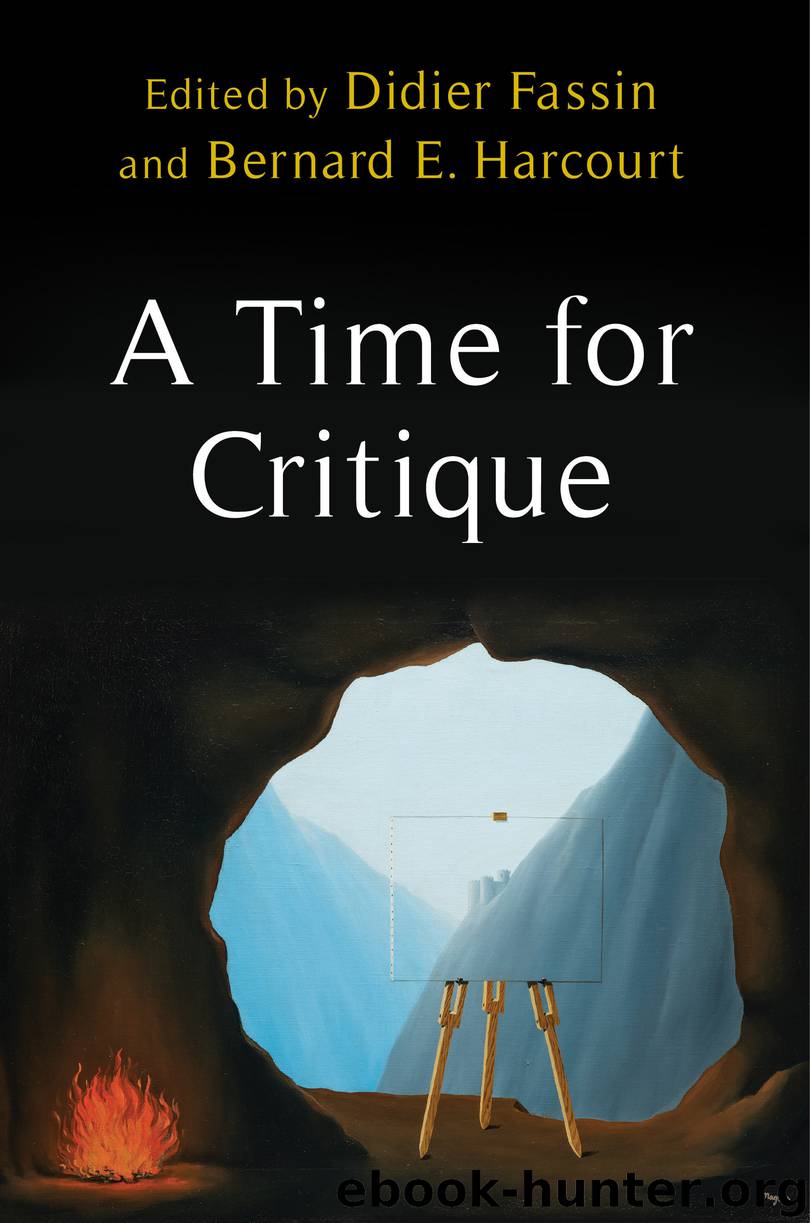A Time for Critique by Bernard E. Harcourt

Author:Bernard E. Harcourt
Language: eng
Format: epub
Publisher: Columbia University Press
CHAPTER 9
CRITICAL THEORY IN A MINOR KEY TO TAKE STOCK OF THE SYRIAN REVOLUTION
FADI A. BARDAWIL
They refuse to see us
—Yassin al-Haj Saleh
We do not anticipate the world with our dogmas
but instead attempt to discover the new world
through the critique of the old
—Karl Marx
The academic preoccupation with the vicissitudes of critique has done a good job at highlighting how conservative forces and those in power manage to hijack a critical arsenal associated with progressive causes and radical politics. Anthropologists have been drawing our attention for a while now to such processes as appropriations of feminist languages by Christian fundamentalists. They have also revealed the limits of formal left-liberal demands for representation, such as those for equal time, which are now requested by conservatives and granted by the media to climate change deniers. In the wake of the proliferation of such acts of appropriation and hijacking by the likes of conspiracy theorists, and powerful state actors, Euro-American calls were issued to forgo the critical project, deemed exhausted, altogether.1
Yet the appropriation of critical moves—such as social constructionism—which are deemed to carry an a priori liberatory potential, by agents on the opposite of end of the political spectrum (say, by climate change deniers who wield it to cast doubt on the solidity of scientific evidence), is nothing new. Edward Said’s Orientalism, a seminal text of critique, which transformed the academic landscape globally and whose insurrectionary fire bypassed the university’s high walls, leaving its mark on the worlds of art and politics, was read by some nationalists and Islamists as an apology for the Arabs and Islam. In its travels back to the Arab world the critical edge of Said’s work was appropriated by nativists who transformed it into ideological fuel for their anti-Western rhetorics. In an afterword written about a decade and a half after Orientalism’s publication, Said clarified his points and lamented the reception of the book in the Arab world, which equated the critique of Orientalist knowledges with a systematic defense of Arabs and Islam, or an endorsement of nationalist and religious politics. Orientalism, Said wrote, “almost in a Borgesian way, has become several different books.”2
In revisiting Orientalism’s travels, I aim not simply to make a historical point—namely that there are precedents to the appropriations of critical works and that what is now taken as a recent development is not so new after all. Rather, I want to make the conceptual point that one cannot determine in advance the uses to which a critical work can be put. Actors, as different as secular Arab nationalists and Islamists, can appropriate critique and transform it into ideology and an instrument of power. Once one starts from the premise that there is no way to fix a priori the pragmatic effects of a critical work as it travels in time and space, and between different constituencies, the injunction to forgo critique because it is being hijacked loses its purchase. This premise is also a reflexive reminder that critique, particularly in its Olympian versions, must not forget its own worldliness.
Download
This site does not store any files on its server. We only index and link to content provided by other sites. Please contact the content providers to delete copyright contents if any and email us, we'll remove relevant links or contents immediately.
The Secret History by Donna Tartt(19088)
The Social Justice Warrior Handbook by Lisa De Pasquale(12190)
Thirteen Reasons Why by Jay Asher(8910)
This Is How You Lose Her by Junot Diaz(6887)
Weapons of Math Destruction by Cathy O'Neil(6280)
Zero to One by Peter Thiel(5802)
Beartown by Fredrik Backman(5754)
The Myth of the Strong Leader by Archie Brown(5507)
The Fire Next Time by James Baldwin(5446)
How Democracies Die by Steven Levitsky & Daniel Ziblatt(5219)
Promise Me, Dad by Joe Biden(5153)
Stone's Rules by Roger Stone(5088)
A Higher Loyalty: Truth, Lies, and Leadership by James Comey(4964)
100 Deadly Skills by Clint Emerson(4925)
Rise and Kill First by Ronen Bergman(4789)
Secrecy World by Jake Bernstein(4753)
The David Icke Guide to the Global Conspiracy (and how to end it) by David Icke(4720)
The Farm by Tom Rob Smith(4512)
The Doomsday Machine by Daniel Ellsberg(4490)
